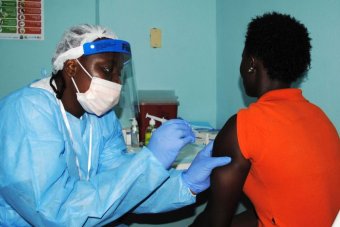A 15-minute, on-the-spot blood test for Ebola is as accurate as the most widely-used laboratory-based test, scientists say after a patient trial.
An affordable, rapid diagnostic test would be an invaluable tool for health workers on the ground, allowing them to quickly identify and isolate infected individuals and curtail the spread of the deadly haemorrhagic virus.
Dubbed ReEBOV, the kit works with a drop of blood from a finger prick and a test strip that changes colour in five to 15 minutes.
It requires very little training to use, but one potential drawback is that it needs refrigeration.
The standard test in use today, RealStar RT-PCR, requires analysis of much larger blood samples at a laboratory with a high biosafety level and trained staff — facilities often not within easy reach of outbreak zones.
Manufactured by German company altona Diagnostics, RealStar also poses risks to those who collect, transport and test the samples.
“Laboratory results can sometimes take days to return,” said a press statement issued by The Lancet medical journal, which published the study results.
Test much faster, possibly more reliable
“Delays like this result not only in the failure to diagnose and treat Ebola-infected patients, but also in individuals without Ebola being admitted to holding units where they may be subsequently infected with the virus,” said senior author Nira Pollock of the Boston Children’s Hospital in the statement.
For the trial, Dr Pollock and a team used both the ReEBOV rapid test and RealStar on 105 suspected Ebola patients in February this year at two government-run treatment centres in Sierra Leone — one of three countries hardest hit by the current outbreak.
ReEBOV detected all 28 Ebola cases diagnosed by RealStar — a 100 per cent level of sensitivity, but much faster.
From this, “we can conclude that the ReEBOV rapid diagnostic test could be very useful as a rapid test for Ebola virus disease at the point of care in high-risk populations,” the study said.
But the research also revealed some disconcerting data concerning the reliability of the benchmark test, RealStar, itself.
Six of the 77 RealStar-negative cases tested positive with ReEBOV.
And further checks with an alternative RealStar-like test called Trombley, not yet in wide use, revealed a handful of cases with low virus levels that had been missed by both the others.
This meant also that the team could not determine how accurate ReEBOV was in patients in the early phase of infection, when virus levels are low.
While other prototype fast-track tests are also being developed and tested, ReEBOV is the only rapid diagnostic test for Ebola to have been granted emergency use status by the UN’s World Health Organisation (WHO).
The WHO says there have been 11,207 reported deaths and 27,443 cases in the current West African Ebola outbreak — the deadliest in history.
AFP

